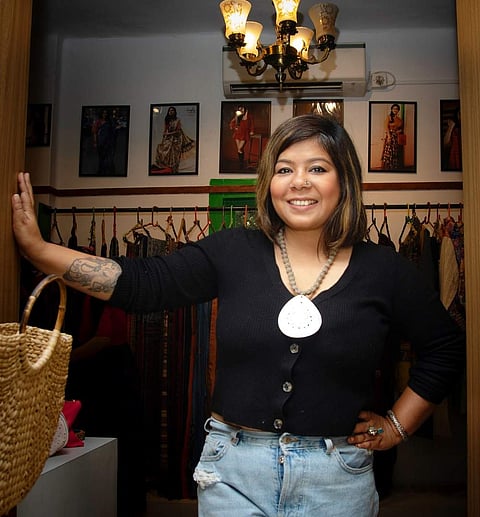
- LIFESTYLE
- FASHION
- FOOD
- ENTERTAINMENT
- EVENTS
- CULTURE
- VIDEOS
- WEB STORIES
- GALLERIES
- GADGETS
- CAR & BIKE
- SOCIETY
- TRAVEL
- NORTH EAST
- INDULGE CONNECT

Known for her signature quirky touch in sustainable pieces, designer Anushree Malhotra steadily traverses the path of ethical and sustainable fashion through her eponymous label. Known for her beautiful jamdani weaves and dresses with unusual cuts, Anushree incorporates a lot of sustainable elements in all her collections including handwoven fabric and eco print and recycling old fabrics and reusing old embroideries and borders are a few of her key design elements. Even all the colours used in her creations are derived from natural sources. But above all this, her goal as a designer is to support a greater number of weavers. In order to provide more work and sustain a group of women who work for her, Anushree has recently converted her studio's rooftop into a cafe-cum- delivery kitchen run by the same women, who churn out sumptuous homely food. We talk to Anushree to know the novel manner in which she is taking her label forward and about her first-ever men's collection.
What are the innovations you are introducing as we go over to 2023?
In 2023 our brand is introducing more recycled embroidery and focussing more on the finishing and detailing of each garment. Also, we are focussing more on menswear and vintage embroidery.
How as a brand have you evolved over the years?
Establishing a brand is never easy -- a lot of dedication is needed. But if you love your work and you pour your heart into it then all the struggle seems easy. As a designer, I always tried to lean on creativity from the very onset. Following current trends has never been my thing, rather I always try to rejuvenate fabrics, and create my own fashion statements. My works reflect my upbringing, my spontaneous overflow of powerful feelings and a tamed yet true creative spree. I think that's what helped me to evolve as a brand.
How are you bringing in the sustainability factor in your enterprise?
You can look for plenty of instances of sustainability in our textile history. From the ages of the Silk Route to recent trends of supporting sustainable fashion, it was always there. I don't intend to humiliate any fashion trend or the use of any fabric, but truly speaking, our tendency to copy western fashion and our irresistible colonial hangover, took us away from our roots and the textile industry is not an exception. Bengal's rich heritage of textiles -- be it Muslin, Tangail, Baluchari, or phulia, shantipuri, dhaniakhali -- has always been an inspiration for me. I think I am nobody to bring sustainability to fashion, it was always there but most of us forgot that intentionally. I simply want to remember my roots and our fabrics and simply showcase them through my brand.
How is the market evolving over the years for homegrown designers?
The market is evolving for homegrown designers in a positive way as people now are becoming more sensitive towards whatever they wear and also trying to support local talent and the environment around them.
What are the expectations of millennials and how as a label you are adapting to their needs?
The millennials really prefer to support a brand with a social cause and they value creativity. They want to buy things that are not only fashionable but also responsible for society.
We as a brand are trying to be creative and authentic, providing millennials with the best quality attire at the best possible price.
What do you think will rule the fashion scene in 2023?
Lighter materials, comfy clothing, a lot of happy-go-lucky colours, prints, pastel shades, hand-woven embroidered dresses and all-time classic silk materials.
Tell us a little about your cafe initiative?
Rahee tea time is a collaborative effort of me, my friend Arpita Chakraborty and all the women who work relentlessly for Rahee every day. It's a rooftop cafe run by the underprivileged women of the Ballygunge slum area. They cook Bengali and fusion food filled in a completely homely style. The entire fund raised from this cafe is being used for the uplift of underprivileged women and children.
Your upcoming collections?
Currently, I am working a lot on a men's collection called Saabeki, which comprises cotton khadi kurtas with intricate embroidery works, dhoti pants and co-ord shawls.
Available at 24/A Old Ballygunge Second Lane. On anushreemalhotra.com.